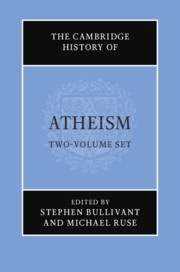Book contents
- The Cambridge History of Atheism
- The Cambridge History of Atheism
- Copyright page
- Dedication
- Contents
- Acknowledgments
- Contributors
- Introduction
- Part I Preliminaries
- Part II Atheisms in History
- Part III Reformation, Renaissance, Enlightenment
- Part IV Classical Modernity: Philosophical and Scientific Currents
- 18 Romanticism
- 19 John Stuart Mill on Religion, Utility, and Morality
- 20 The Physical Sciences
- 21 Charles Darwin and the Darwinians
- 22 Freud and the Unconscious
- Part V Classical Modernity: Social and Political Currents
- Part VI Twentieth and Twenty-First Centuries: Intellectual and Artistic Currents
- Part VII Lived Atheism in the Twentieth- and Twenty-First Centuries: Case-Studies
- Part VIII Emerging Atheisms in the Twenty-First Century
- Part IX Conclusion
- Index
- References
22 - Freud and the Unconscious
from Part IV - Classical Modernity: Philosophical and Scientific Currents
Published online by Cambridge University Press: 25 September 2021
- The Cambridge History of Atheism
- The Cambridge History of Atheism
- Copyright page
- Dedication
- Contents
- Acknowledgments
- Contributors
- Introduction
- Part I Preliminaries
- Part II Atheisms in History
- Part III Reformation, Renaissance, Enlightenment
- Part IV Classical Modernity: Philosophical and Scientific Currents
- 18 Romanticism
- 19 John Stuart Mill on Religion, Utility, and Morality
- 20 The Physical Sciences
- 21 Charles Darwin and the Darwinians
- 22 Freud and the Unconscious
- Part V Classical Modernity: Social and Political Currents
- Part VI Twentieth and Twenty-First Centuries: Intellectual and Artistic Currents
- Part VII Lived Atheism in the Twentieth- and Twenty-First Centuries: Case-Studies
- Part VIII Emerging Atheisms in the Twenty-First Century
- Part IX Conclusion
- Index
- References
Summary
Sigmund Freud’s critical theory of religion continues to generate controversy and dismay within and beyond psychoanalysis. A number of his critics attempt to separate his views on religion from the rest of psychoanalysis, a misguided and fruitless enterprise, as I will demonstrate in this chapter. Such critics appear to think that religious experiences and beliefs must be protected from psychoanalytic theories such as unconscious fantasy and projection in order to maintain the illusion that religious realities possess their own sui generis essence or inherent nature that renders them immune to critical examination and explanation. From the perspective of psychoanalysis, transcendent dimensions are not independently existing ontological realities that are apprehended by human minds. Rather, they are mental creations that are culturally constituted, shaped, and expressed. While it is not unreasonable to interpret Freud’s writings in a broadly colloquial sense as atheistic, it is woefully insufficient for scholarly analysis.
- Type
- Chapter
- Information
- The Cambridge History of Atheism , pp. 404 - 422Publisher: Cambridge University PressPrint publication year: 2021



